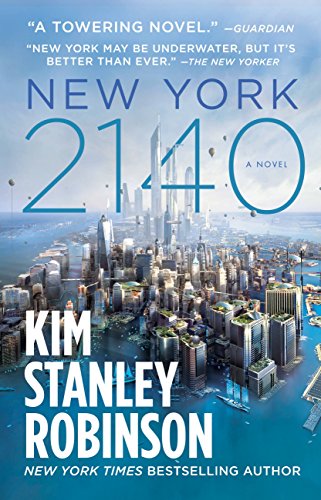You know that bit in Hamilton where the characters take a moment to exult in the unique glory of New York City as both an exemplar and a template for urban life? That same Big Apple swagger can be applied to speculations of future history just as easily as reinterpretations of past history.
 Kim Stanley Robinson’s New York 2140 is a classic near-future science-fiction novel, postulating humanity’s failure to adequately respond to the threat of global climate change and the resultant chaos and upheaval that ensue when all of Earth’s coastal cities are flooded by rising sea levels. The story of that upheaval would be interesting, of course, but Robinson sets the story multiple decades after the latest major change, instead looking at what the “new normal” might be in a New York City where most of what we currently consider to be prime Manhattan real estate has become an intertidal zone.
Kim Stanley Robinson’s New York 2140 is a classic near-future science-fiction novel, postulating humanity’s failure to adequately respond to the threat of global climate change and the resultant chaos and upheaval that ensue when all of Earth’s coastal cities are flooded by rising sea levels. The story of that upheaval would be interesting, of course, but Robinson sets the story multiple decades after the latest major change, instead looking at what the “new normal” might be in a New York City where most of what we currently consider to be prime Manhattan real estate has become an intertidal zone.
Robinson looks at this new world through multiple lenses via multiple viewpoint characters. Our cast of characters includes multiple people from different segments of the financial industry, an NYPD inspector, a pair of treasure-seeking street urchins, an airship-piloting nature-adventurer YouTube star, a building superintendent, and an unnamed “citizen” whose function falls somewhere between expository historian and opinionated rambler. The picture the author paints of the 22nd century is, accordingly, well thought out from multiple angles; while parts of the story are more or less a paean to the glories of New York City, others are completely unflinching in their analysis of how our present social and political systems have failed us. As he did in his Mars trilogy, Robinson brings together a dizzying array of disciplines in imagining the world of 2140 – economics and finance, geology and hydrology, engineering and architecture, history and cartography, political science and sociology – and the result is a well-rounded, convincingly speculative narrative of where the next century-plus is going to take us if we don’t get our metaphorical shit together. The conclusion is a little more optimistic than I felt was warranted based on the rest of the story, and Robinson’s usual extrapolation of complex situations seemed to be eliding a few factors in order to bring the story to a satisfying end, but it’s also possible optimism just feels a little naive to me lately. Nevertheless, like all good science fiction, New York 2140 offers a lot of insight into the present day.
My Hugo ballot so far:
- The Stone Sky, N.K. Jemisin​
- Provenance, Ann Leckie
- New York 2140, Kim Stanley Robinson
0 comments ↓
There are no comments yet...Kick things off by filling out the form below.
You must log in to post a comment.